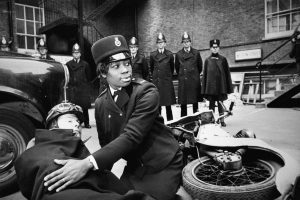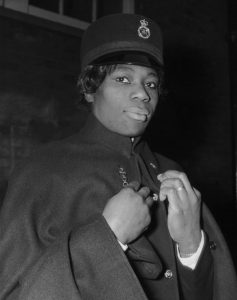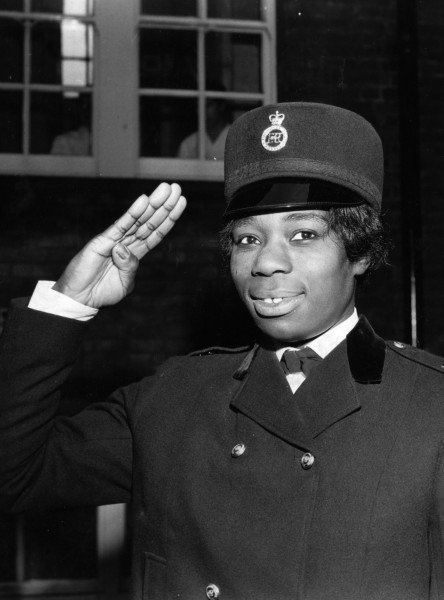As we Salute Our Sisters, this week we pay homage to Sislin Fay Allen, better known as Fay Allen, a name that may not be as widely recognized as others, but her contributions are immeasurably significant. Fay Allen made history in Britain, shattering gender and racial barriers, and inspiring generations to come as she became the first non-White woman police constable in Britain.
The thought of a dark-skinned young Jamaican woman dressed in a police uniform in the 1960s was a shock to the people of London, but Fay Allen set out to break this barrier.
A Beacon of Inspiration
Born in Jamaica in 1948, Sislin Fay Allen came to the UK in 1962, a time when opportunities for Black women were limited. She embarked on a path that would soon become legendary.
Her aspirations led her to become the first Black woman to join London’s Metropolitan Police Service in 1968, marking a milestone not just for herself but for the entire nation.
Black people have not had the best of relationships with law enforcement, and Fay set out to change this and be an optimistic hope for her community and for minority communities everywhere.
Breaking the Mold

At the age of 29 in 1968, Fay worked as a nurse at Croydon’s Queens Hospital. One day whilst on her break, she came across a job advert in the newspaper for police officers which she pondered applying for.
This was not long after the Notting Hill riots of 1958, and there were no black female officers. This was something she wanted to change, so she sent in her application whilst keeping it a secret from her family. “I didn’t tell anyone about it until I was sure. My family would have wanted to maybe tell me not to do it, but I just went and did what I wanted to do and that was that.”
Fay recalls the interview process –“On the selection day there were so many people there, the hall was filled with the young men. There were ten women and I was the only Black person.”
After passing a set of very tough exams, followed by a medical, the police force wrote back to her and told her that she got the job. Her family were shocked. As Fay put it “I can remember one friend said, `Oh they wouldn’t accept you, they don’t accept Black people in the force’, and so I said `Well my dear, I’ve got news for you’ and I showed her the letter.”
She became a part of the Metropolitan Police in Croydon, in what was a very audacious move during a time when prejudice and discrimination were deeply entrenched in society. Fay faced skepticism, isolation, and blatant racism within the ranks but this did not faze her one bit.
Her presence alone challenged stereotypes and demanded a reevaluation of the institutional norms.
Dedication and Determination
Sislin Fay Allen’s journey was not without its struggles. She endured both overt and subtle forms of discrimination.
She even described a time when the police force received tons of mail about her, both good and bad. “They gave me the good ones, they never, ever gave me the bad ones. They told me about them but they never showed me because they thought it would distress me and maybe they thought I would resign.” However, her dedication to public service and her community was unwavering.
She spent four years with the Metropolitan Police at Croydon police station, before working with the Missing Persons Bureau at Scotland Yard, and eventually transferring to Norbury police station. She would then go on to return to Jamaica and work for the Jamaican police force.
Reflecting on her time at the Met, She said “People would come up to me, some congratulated me and thought it was pleasant to see a black person, but some thought it wasn’t.”
She ended up serving as a police officer for more than 30 years, dedicating herself to safeguarding the rights and well-being of the citizens she served.
Legacy and Inspiration
Sislin’s legacy extends far beyond her remarkable career. She was a living testament to the idea that one person can make an enormous difference. Her story inspires all who aspire to break free from societal constraints and redefine what is possible. Her journey reminds us that progress is often born from the relentless determination of those who refuse to accept the status quo.
Fay Allen’s legacy lives on in the Metropolitan Police, where women now make up more than a quarter (27%) of the force.
She has most recently been honored with The Sislin Fay Allen Centre in London, a training centre that is used for the training of officers and staff from across all levels of policing
As we celebrate Black History Month, we salute our sister Sislin Fay Allen for her groundbreaking achievements, her tenacity, and her enduring spirit. She reminds us that, in the face of adversity, it is possible to rise, inspire, and change the course of history.

